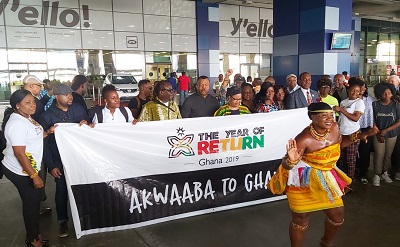The ‘Year of Return’ in retrospect: Implications for the tourism and travel industry in Ghana

The Ministry of Tourism, Arts and Culture, in conjunction with its implementing agency, the Ghana Tourism Authority, had implemented the government’s initiative christened, the “Year of Return” in 2019 to encourage not only the Diaspora to visit their motherland, Ghana and/or Africa, trace families lineage, build bridges among brothers and sisters but also contribute to nation-building via investing in the Ghanaian economy.
For purposes of education, 2019 marked 400 years of the slave trade, which saw strong and able-body men and women forcibly taken from Africa, shipped like animals to the US and, to work on the “master’s” plantations.
It is, therefore, extremely crucial to celebrate and remember the living hell of the “middle passage” and lives of unremitting toil on the plantations, use the occasion to project the African values, and the economic, cultural and intellectual contributions they made to building the US’ nationhood while incentivising Diaspora investment on the Continent for economic development to largely fulfill the dreams of our founding fathers of unity for Africa.
Whether or not the efforts, made in 2017 by the US Congress in passing the 400 Years of African-American History Commission Act, which establishes a provisional History Commission for marking the 400th Anniversary and beyond, have changed the xenophobia and racial discrimination against the African-American is yet to bear fruits.
Indeed, the initiative had and continues to bring the Diaspora to Ghana with impressive outcomes for the tourism industry and its players. First of all, the hospitality sector had received a big boost; hotels recorded high occupancy and together with other ancillaries and expenditures combined, incomes were expected to be astronomically high for 2019 relative to past years.
According to the General Manager of Kempinski Hotel, Gold Coast City, Accra, Ghana, the “Year of Return had kept us busy yearlong.” That the 5-Star Hotel had experienced high occupancy during the period under review means other 4, 3, 2 and 1-Star rated and budget hotels, including lodges had not been excluded in the sharing of the windfall.
Again, the food industry had its own market share expanded. Restaurateurs and local food vendors saw their turnovers soared up via the high demand by tourists and the Diaspora presence in the country.
“Kelewele”, as well as other savoury sellers, also jumped onto the bandwagon for a share of the windfall, emphasising the multi-dimensional, multi-faceted and pro-poor nature of tourism, leading to equal distribution of incomes for both the rich and the poor.
Additionally, the initiative had produced a viable money-making environment for tour operators and taxi drivers. This is because transportation plays crucial roles in tourists’ lives, and, more especially, the experiential nature of the tourism and travel industry is made through moving from one attraction to another, including sightseeing.
The social connection spiraling cohesion, networking and other cultural activities that took place across the country were evident in the power of the initiative.
More important was the economics behind the funfairs and the generation of jobs for incomes and livelihoods and, particularly, the collective energy released into organising them.
The above notwithstanding, the initiative brought, in its wake, investor groups into the country, who expressed interest in investing in the hospitality industry, trade, commerce, transportation, among other infrastructural development undertakings.
It is imperative that the Ghanaian economy participates in these investment opportunities and to make it count for the Ghanaian.
For the tourism sector to gain more from the benefits resulting from the 2019 Year of Return, the industry players must develop, produce and re-package tour guiding as an essential tourism product.
This is because Ghana needs multi-lingual tour guides to conduct tourists from non-English speaking countries; and a critical consideration for the country to be a truly, preferred, tourist destination not only in West Africa and the rest of Africa but also internationally.
Interestingly, however, some institutions were very instrumental in decorating their offices to add flavour and spice up the festive season and create an atmosphere of merrymaking and ignite the momentum for our visitors, including the Diaspora.
Indeed, Zenith Bank exemplified this act and decorated its offices and, therefore, the best, in my estimation and, deserves praise. While the government via Ministry of Tourism, Arts and Culture, in close collaboration with its implementing agency, continues to promote, brand and market Ghana through tourism, it is significant that the private sector actors also make some inputs for the realisation of the ultimate goal of making Ghana the preferred tourists’ destination; since tourism is usually public sector-led and private sector driven.
In a nutshell, the 2019 Year of Return had catapulted tourism enterprise to a higher pedestal through Diaspora visits to Ghana and/or Africa, strengthened the Diaspora investment spirit and enhanced cultural synergies for social harmony and incentivised cross-fertilisation and/or hybridisation of ideas for economic revolution and expansion.
The writer is the Director, Monitoring and Evaluation
Ministry of Tourism, Arts and Culture
055 20 60 957
By DR ALPHONSE KUMAZA




